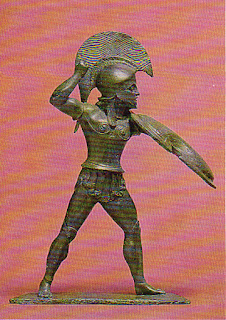Last entry talked about the various ways in which Spartan officers may have been elected/appointed. In this excerpt I describe a concrete case of a lochogos (divisional commander) selecting his deputy with an eye toward influencing the already mad Agiad king Cleomenes.
Kyranios' head was was killing him. He felt as if one of the Titans had clamped his hand around his skull and as pressing inward. Kyranios could picture the plates of his skull fracturing like an egg pinched between the Titan's thumb and forefinger. He put his fingertips to his temples and tried to rub the pain away.
Kyranios did not believe the authenticity of the oracle Cleomens claimed to have received from Delphi. He as not alone in his doubts. King Demaratus had openly scoffed at it, asking Cleomenes what it had cost him. This, however, had only led to a violent verbal exchange between the two kings that had demeaned and discredited them both. Leotychidas, however, sensing a new opportunity to discredit Demaratus, had done all he could to ensure a majority in favor of war when the proposal came to the vote in the Assembly.
Had they all gone mad? Kyranios asked, closing his eyes to the pain and fear that was starting to unman him. No, not all. It had been a close vote, repeated three times, but the young men, like young men always, were full of themselves, cocky, spoiling for a fight...
A knocking on the door made Kyranios lift his head, drop his hands, and square his shoulders firmly. "Come in!" he barked, while his quartermaster and clerk looked briefly over their shoulders toward the door.
Leonidas entered, his helmet in the crook of his elbow, his leather corselet gleaming with oil, and his chiton fresh and clean -- as was proper when a junior officer reported to his superior. "You sent for me, sir?"
Kyranios nodded and signaled Leonidas to come forward, but did not stand. He was afraid that getting to his feet would make him dizzy and that Leonidas might notice he was off balance. "I have bad news for you," he announced, watching Leonidas' expression.
Leonidas, he calculated, was thirty-five -- exactly the age he'd been when he'd taken over the lochos. Leonidas admittedly had less experience as a company commander -- just three years -- but he had handled his company, and before that his task force during the expedition with the Corinthian grain fleet, splendidly. And Leonidas was an Agiad. Kyranios felt he had to take a chance on him.
Kyranios drew a deep breath. "You aren't going to like this," he told Leonidas bluntly, "but I have decided to appoint you my deputy; my current deputy will take over your pentekostus."
Leonidas started visibly and then asked simply, "Why?"
"I need you. That will have to be reason enough for you. Now, as my deputy, come with me to the Agiad Palace." Kyranios pushed his chair back and dragged himself to his feet, closing his eyes briefly a the room spun around him. When he opened his eyes again, Leonidas was holding out to him the white-crested helmet denoting his rank as lochagos and watching him keenly, but he said nothing.
They walked in silence down the long corridor and out onto the porch of the lochogos headquarters. Kyranios kept waiting for Leonidas to say something. He knew Leonidas enjoyed command -- just as he had. He was sure he did not want the position of deputy, which was a position without direct command authority, a position more like an advisor.
...
[The five lochagoi and their deputies] left the palace and dispersed in the direction of their respective headquarters. Kyranios and Leonidas again walked side-by-side in silence, until Kyranios asked, "You understand what needs to be done, don't you?"
"You want me to keep my brother in check."
"Yes, I do."
"I'm not sure it will work. He doesn't respect my opinion -- as you saw this afternoon."
"What I saw was that you made him stop and think for a very long time. That's a good start. Not many men can do even that anymore."
Leonidas sighed and nodded.




